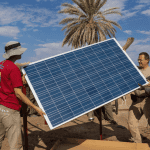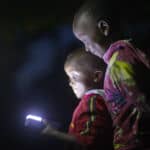Are Financial Returns Starting to Compete with Social Goals? An Impact Investor Assesses its Involvement in Off-Grid Solar
Part one of our discussion sought to answer two questions related to “economic” value: Will off-grid solar companies become operationally profitable so that they are less dependent on equity and debt in the future? What is proving to be the most successful off-grid solar business model?
Here, we’ll attempt to answer a question related to “social” and “environmental” value: Is achieving financial returns starting to compete with social impact? It’s a question Oikocredit has continuously evaluated since its inception over 40 years ago. Here’s what we’ve discovered about whether or not we’re really helping people and the planet.
The social impact
To overcome the financial and operational challenges off-grid solar companies often face, and to increase margins, we see some companies moving toward larger solar products and a higher customer segment. According to GOGLA: “Off-grid brands have reacted to this competition by focusing on developing distribution networks, entering new countries, selling more powerful systems with higher margins or developing new applications for urban back-up lighting or camping.” Providing existing customers with add-on products is an important aspect of future profitability for all off-grid models. In some countries, companies cannot compete unless they offer systems that already include larger products such as a TV. We also see off-grid companies that focus on customers with income-generating activities and/or a higher segmentation of customers.
From a financial standpoint, offering larger systems to higher-income customers living in less remote areas might seem like a better recipe for success. Instead of moving into a higher customer segment after realizing margins are too tight in remote low-income areas, it might be better for off-grid companies to start their business in a higher segment that is easier to access and move into more rural areas as they become financially stronger. At the same time, in urban areas off-grid companies will compete with the national grid or other cheaper forms of energy and will not reach the poorest people. Therefore, we also appreciate the introduction of technological developments such as satellite mapping of rural areas to increase efficiency in customer acquisition. All in all, in defining their competitive advantage and striving for profitability, we are seeing more of a range of off-grid business models catering to different customer segments.
Nevertheless, each off-grid company will have an environmental and social impact. In Oikocredit’s experience, the marginal improvement provided by off-grid solar solutions may be less significant for people with a higher income or a business, but it still offers them a better situation than if they remained without solar electricity. Although we appreciate critical studies about the overestimation of economic impact of off-grid systems, the high demand for off-grid electricity is a clear sign for us that customers see benefits for their living conditions. This was also confirmed in our visits to communities that benefit from the portfolios that we fund. Research by renowned international organisations also observes that energy access can enable households to save money, provide better lighting and offset greenhouse gas emissions.
The environmental impact will in each case be relevant, whether solar is installed on a large corporate’s rooftop or a low-income household, since clean energy will be replacing kerosene, diesel generators, charcoal, etc. The social impact is less straightforward and will be determined by different indicators such as energy access, availability and reliability, as well as income generation versus costs to consumers. Different social impact goals may not be achievable at the same time. For example, providing energy access to people may not be directly compatible with alleviating poverty. Providing a household with lighting might not necessarily mean their income will increase, although improvements in health, education and safety could have an indirect impact.
In terms of poverty alleviation, it may be more impactful to offer solar solutions to people with income-generating activities. Providing a farmer with a solar water pump so that (s)he can irrigate his/her crops and generate more income, would be one example. A study by the World Resources Institute argues “the more solar systems can be encouraged to support a broader set of services, particularly productive uses, the greater the potential for off-grid systems to serve as a mechanism for rural development.”
Whichever customers are targeted, anecdotal evidence shows that more than half of new pay-as-you-go customers do not have a relationship with a financial institution. For this reason, the widest social impact the off-grid sector offers is access to new products and the development of long-term relationships that could expose customers to other products and services in the future. We see this already happening with companies providing products in parallel with solar systems, like water filters and low-cost computers. Just as solar systems are becoming more efficient and cheaper, we also see many innovations in such low-voltage appliances. Indeed, the cost to customers of different energy products/services and the availability and reliability of the supply of electricity could be relevant measurements of social impact going forward. Accordingly, Oikocredit would like to see – and is interested in developing – better indicators for tracking the social and environmental impact of investments in the off-grid solar sector.
Conclusion: Should we keep investing in off-grid solar?
From Oikocredit’s point of view, the answer is yes. Although there is still some way to go before off-grid solar companies become financially sustainable, the potential future value of the sector, in our opinion, is large. We see this in the economic value resulting from high customer growth partly in formerly underserved markets; the social value created by increased financial inclusion, health and education; and the environmental value of emissions avoided. The amount of economic, social and environmental impact will vary, yet investing in off-grid solar allows Oikocredit to provide its own investors with the opportunity to support such a triple bottom line.
Laura de Bresser, a renewable energy project analyst for Oikocredit International, wrote this blog with input from other members of the renewable energy team.
Photo by Rachel Couch for Power Africa via Flickr
- Categories
- Energy, Impact Assessment, Investing, Social Enterprise



